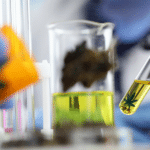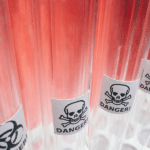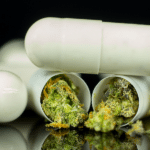Giving medical cannabis to infants is a difficult taboo to shift, but new research is paving the way. The launch of a clinical trial examining the use of CBD in newborns suffering from hypoxic ischemic encephalopathy (brain damage caused by lack of oxygen) means new hope for the million plus babies born each year with this condition. These infants are often left severely disabled, and many die.
Hypoxic ischemic encephalopathy (HIE) caused by asphyxia is the leading cause of infant fatalities in the United States (1). Despite this, HIE is considered a rare disease as it only affects 2 or 3 newborns in every 1000. Factors leading to HIE include maternal diabetes, lack of blood circulation to the placenta, preeclampsia, congenital infections of the fetus, drug and alcohol addiction, as well as complications during delivery. Premature babies are at particularly high risk of death or disability if HIE occurs after delivery.
Right now, the standard treatment for severe HIE is hypothermia – reducing the baby’s body temperature to 33-34°C. Hypothermia has been found to have neuroprotective effects, reducing brain inflammation and glutamate production, as well as lowering the production of free radicals. Given within 6 hours of birth, hypothermia can prevent death or severe disability in 60% of cases.
Spanish Researchers Find Promise in Cannabinoids
“Before the appearance of hypothermia a few years ago, there was nothing that could be done,” explains Dr. José Antonio Martínez-Orgado, Associate Professor of Pediatrics and head of the Neonatology Division at San Carlos Hospital, Madrid, Spain.
“So time after time, you were at the bedside of a very nice, very good looking baby, and it had some kind of problem during the delivery and it was close to dying or with very, very substantial damaged brain,” Dr. Martinez-Orgado told Project CBD, “It was for me a challenge. We should do something.”
Dr. Martinez-Orgado began his hunt to find an adjunct treatment to hypothermia that would improve these babies’ outcomes. In preclinical studies, the neuroprotectant effects of cannabinoids came up time and time again, so he decided to investigate their effects in animal models of HIE.
Martinez-Orgado and his team opted to focus on CBD rather than THC, as the non-intoxicating cannabinoid was considered safer for immature brains due to its lack of direct CB1 receptor activation. They consistently found that CBD reduced neuro-inflammation, minimized damage caused by oxidative stress, and diminished glutamate-related excitotoxicity – which are considered the three major causes of brain damage in people of all ages (2). However, in newborns, this triad of events cause disproportionately severe brain damage compared to similar occurrences in older children and adults.
“That’s why,” says Martinez-Orgado, “it’s so difficult to treat babies suffering from brain damage, and how mandatory it is to find something that acts on the three components at the same time. This was hypothermia and this is CBD.”
Game-Changer
Despite years of successful studies proving CBD’s potential as an effective drug for HIE, the Spanish researchers have struggled to move forward to the clinical trial stage. “Maybe because it’s looked on as cannabis, we have been asked to give a substantial amount of evidence of efficacy and safety for CBD treatment that for other treatments had not been required,” reflects Martinez-Orgado.
However, the team’s most recently published preclinical study (3) proved to be a real game-changer. They tested CBD alongside hypothermia in a piglet model of hypoxic-ischemic brain damage and the results were astonishing.
Intravenously injected, purified CBD was given in three doses to hypoxic-ischemic, insult-induced newborn piglets that had already been through hypothermia.
“When we used them together,” says Martinez-Orgado, “they were reducing brain damage by almost 100%. So there was a dramatic synergistic effect because hypothermia alone and CBD alone were not working. CBD and hypothermia together led to a remarkable neuroprotective effect.”
CBD & Hypothermia
These positive results have paved the way for this summer’s GW Pharma-backed stage II/III clinical trial taking place in hospitals across Spain and the UK.
Using the same intravenous CBD delivery method, newborns with brain injuries will be given either hypothermia and CBD, hypothermia on its own, or hypothermia plus a placebo. The CBD will be highly purified as even small amounts of other cannabinoids or compounds may not be tolerated when given intravenously.
While Martinez-Orgado feels hopeful about the results, he knows that doctors will face many unpredictable factors not experienced in a controlled, preclinical setting.
“When we were doing the preclinical studies with animals,” he explains, “you know exactly when the hypoxic-ischemic insult occurs. And you know exactly how many minutes or hours after that you have to start the treatment. The problem with the human baby is that it’s inside the mother’s womb, and when the mother comes to the hospital, we don’t know when the hypoxic-ischemic insult started.”
To complicate matters further, doctors have a very limited window of opportunity as hypothermia must be carried out within 6 hours of birth. However, CBD may widen this therapeutic opening: in a previous study on mice, the cannabinoid was found to be neuroprotective when administered for up to 24 hours after the hypoxic-ischemic insult occurred (4).
CBD: An Emerging Brain Trauma Medication
In the end, there’s never any guarantee that positive results from a preclinical study will be replicated in humans with sufficient efficacy and safety for a drug to be approved. In the case of this particular clinical trial, the team will have to wait 18 months after the CBD has been administered in order to know for sure whether the babies are free from long term neurological impairment.
It’s noteworthy, however, that CBD has already reached this stage as a potentially life-saving treatment for the most vulnerable of patient populations – an achievement that highlights CBD’s potential as a safe and highly effective treatment for minimizing the severe effects of brain injuries in patients of all ages.
Mary Biles, a UK-based journalist, educator, and Project CBD contributing writer, is the author of The CBD Book (Harper Collins, UK). © Copyright, Project CBD. May not be reprinted without permission.
References
- Birth Injury Guide
- David Fernández-López, Ignacio Lizasoain, Maria Ángeles Moro, and José Martínez-Orgado, Cannabinoids: Well-Suited Candidates for the Treatment of Perinatal Brain Injury, Brain Sci. 2013 Sep; 3(3): 1043–1059.
- Lorena Barata, Luis Arruza, Maria-José Rodríguez, Esther Aleo, Eva Vierge, Enrique Criado, Elena Sobrino, Carlos Vargas, María Ceprián, Ana Gutiérrez-Rodríguez, William Hind, José Martínez-Orgado, Neuroprotection by cannabidiol and hypothermia in a piglet model of newborn hypoxic-ischemic brain damage, Neuropharmacology Volume 146, 1 March 2019, Pages 1-11
- Mohammed N, Ceprián M, Jiménez L, Pazos MR, Martínez-Orgado J. Neuroprotective effects of cannabidiol in hypoxic ischemic insult. The therapeutic window in newborn mice. CNS & Neurological Disorders – Drug Targets 2017;16: 102-108







